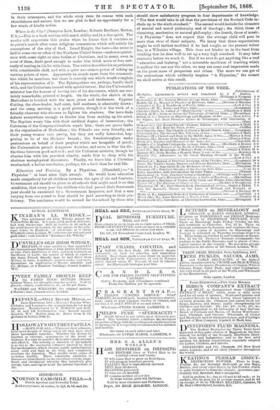Where is the City? (Sampson Low, London ; Roberts Brothers,
Boston, U.S.)—This is a book written with much ability and in a fine spirit. The reader will appreciate this praise when he learns that it contains an inquirer's search after some religious communion which will satisfy his conceptions of the city of God. Israel Knight, the hero—the scene is laid in some one or other of the Northern United States—makes acquaint- ance with some eight or nine bodies of Christians, and in many, even in most of them, finds good enough to make him think more or less seri- ously of casting in his lot with them. The writer describes his experiences with considerable skill, and with a quite uncommon power of taking up various points of view. Apparently he stands apart from the communi- ties which he mentions, but there is scarcely one which would complain of his representation of it. The Episcopalians are, perhaps, hardly dealt -with, and the Unitarians treated with special favour. But the Universalist minister has the honour of having two of his discourses, which are cer- tainly remarkable, printed at length. On the whole, the sketch of the Methodists is touched with the most grace and tenderness. Cyprian Cutting, the class-leader, half saint, half madman, is admirably drawn ; and the camp meeting is a good picture, though it is the work of a friendly observer who chooses to lighten his shadows. Our hero finds defects everywhere enough to hinder him from making up his mind. The Baptists weary him with their cardinal dogma of immersion ; the Calvinism of the Congregationalists repels him ; there are grave faults in the organization of Methodism ; the Friends are very friendly, and their young women very pretty, but they are sadly heterodox, hap- pening to be of the Ilicksito branch ; the Swedenborgians make pretensions on behalf of their prophet which are incapable of proof ; the Universalists preach dangerous doctrine, and seem to blur the dis- tinctions between good and evil ; and the Unitarian minister, though he charms him with his practical charity, sends him to sleep with his abstruse metaphysical discourses. Finally, we leave him a Christian unattached, a better conclusion, perhaps, for a book than for real life.






























 Previous page
Previous page